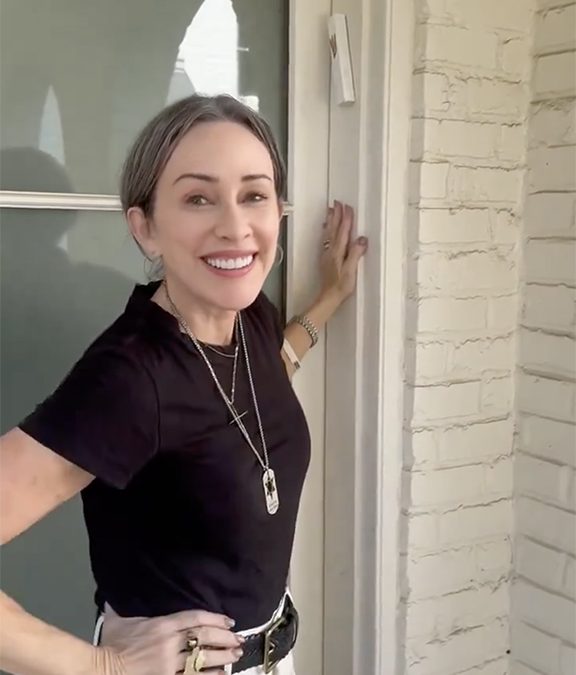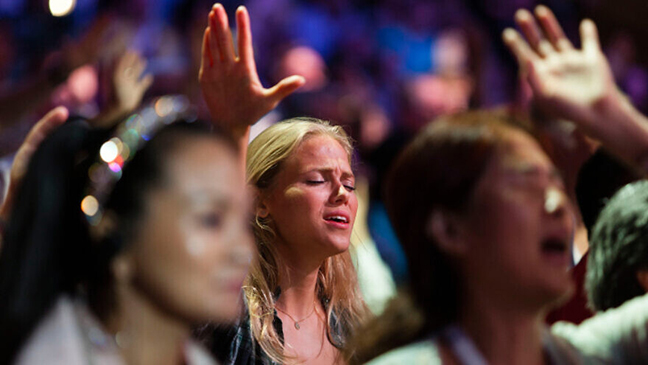Actress Patricia Heaton urges Christians, others to display mezuzah cases in solidarity with Jewish community

Patricia Heaton places a mezuzah on her front door. X screenshot.
by Larry Brook
While traditionally, the mezuzah is seen as a symbol of a Jewish home, there is an effort underway to have it also be a sign of solidarity with the Jewish community by Christian allies.
Actress Patricia Heaton, who is Catholic and is best known for roles in “Everybody Loves Raymond” and “The Middle,” started the MyZuzahYourZuzah campaign, posting a video of herself at her Nashville home, asking non-Jews to “please join me in the #MyzuzahYourzuzah campaign to show solidarity with your Jewish friends and neighbors, fight antisemitism and bless your household.”
After Oct. 7, Heaton saw the Hamas-produced footage of their atrocities against Israelis and how campuses erupted in protest — of Israel. “I looked around for everyone else who was going to be outraged,” she said on a Sept. 23 appearance on Fox and Friends, “and it was very silent, so my partner and I created the October 7th Coalition, or O7C, to help Christians activate, to be as visibly and vocally supportive of Israel, the Jewish people, and fight antisemitism.”
The case for solidarity
Heaton decided to use the mezuzah as the symbol of solidarity and support, and came up with the name MyZuzah for the project.
However, MyZuzah was already the name of a Jewish organization that was established in 2017 to encourage the placement of kosher “fair trade” mezuzahs on every Jewish home in the world, even doing so free for those who can’t afford one. MyZuzah has over 420 partners in 74 countries, and has distributed over 18,000 mezuzahs in the past five years.
MyZuzah Program Director Alex Shapero said Heaton reached out to them a few weeks ago, “and we were happy to get on board.” Seeing the outpouring of anti-Israel sentiment across the country, Heaton “was frustrated at the lack of allies and people who were willing to say that this is wrong,” Shapero said.
The campaign kicked off with Heaton’s appearance at the Israeli American Council Summit in Washington, followed by a Sept. 23 appearance on Fox & Friends, and the posting of her video, which as of press time has over 2.5 million views.
The mezuzah was also chosen because many college students have reported that mezuzahs they put up on their dorm rooms have been vandalized or ripped down. Heaton said “we have to stand up for the Jewish people and for their right to exist, their right to be Jewish and practice their faith.”
Shapero said Heaton’s effort “comes from a place of pure love and support, and a desire to stand in solidarity.”
In the first few days, MyZuzah received “hundreds” of orders. They have been trying to ship as many as possible before the Oct. 7 anniversary, and recipients are asked to post photos or videos to social media of them putting the mezuzah up.
MyZuzah carries a wide range of mezuzah cases, from Gary Rosenthal, “Bourbon Barrel” wood, Yurkovsky, and hand-embroidered designs in clear cases from Yad LaKashish, “Lifeline for the Elderly” in Jerusalem.
The “Solidarity Case,” a basic clear case for $18, has a yellow ribbon in place of the scroll, which the website states is “only required for Jewish homes.”
Proceeds from orders through MyZuzah go toward their program to supply mezuzahs in the Jewish community.
Wide range of opinions
An official Israeli Foreign Affairs Ministry account responded to Heaton’s post: “We are lucky to have you” and “We love this so much.”
“As antisemitism reaches unprecedented levels, thank you, Patricia Heaton, for standing in solidarity with the Jewish people,” it said.
“You are the definition of a righteous gentile,” wrote John Podhoretz, the editor of Commentary magazine. “Thank you, Patricia Heaton.”
Michael Dickson, the executive director of StandWithUs, wrote that “this is some serious love, allyship and solidarity,” and “may the mezuzah protect your home and your loved ones.”
The watchdog StopAntisemitism said it was “thrilled” by Heaton’s call.
Eylon Levy, former Israeli government spokesman who is very active on social media, said “this is a really beautiful gesture of solidarity, and the Jews dunking on this don’t understand how urgently we need our friends and allies to speak up.”
But not everyone is applauding the effort. Shapero said that because of a lack of non-Jewish allies throughout history, many in the Jewish community have a “healthy sense of suspicion,” especially around non-Jewish use of Jewish symbols, which often is followed by attempts to proselytize.
In recent years, there has been concern about the promotion of mezuzahs by “messianics,” especially with cases using symbols related to Jesus.
As for the sacred nature of the mezuzah, Shapero said the case “is merely the protective housing. The important part is the scroll on the inside,” and non-Jews are urged to put up just the case.
He said that many Jews are unaware of that distinction — he has heard of people who put up the case but discarded the scroll, thinking the case was the important part and the scroll was an unnecessary instruction sheet that they could not read because it is in Hebrew.
Julia Ioffe, a founding partner of Puck News and its Washington correspondent, wrote that non-Jews shouldn’t affix mezuzahs. “This is not a show of solidarity but of weird and continued appropriation of our culture and religion,” she wrote. (In another post, Ioffe, who is Jewish, joked about non-Jews getting circumcised in solidarity with Jews.)
“This is not the move. There are far better ways for allies to show their support,” wrote “Bluegrass Rabbi” Shlomo Litvin, who co-runs Chabad of the Bluegrass and the Chabad Jewish Student Center at the University of Kentucky. “Having said that: If you don’t have mezuzos… don’t comment here.”
David May, research manager and a senior research analyst at the Foundation for Defense of Democracies, said “I have mixed feelings about this, but I’m grateful for people who want to show solidarity with the Jewish community. If every house had a mezuzah and if every male wore a kippah, Jews wouldn’t be such easy targets.”
Heaton “isn’t claiming to be Jewish and isn’t claiming to represent Jewish values,” he wrote. “She is just there to show solidarity.”
This is not the first time mezuzahs have been used as an item of solidarity. In 2022, the Hillel at Indiana University distributed several hundred mezuzah cases to non-Jewish students with the inscription “I stand with my Jewish friends” after over a dozen mezuzahs were ripped from dorm doorposts.
In 1993, a “Not In Our Town” campaign in Billings, Mont., responded to antisemitic incidents with the distribution of pictures of a menorah in the local paper, for the entire community to post in their windows in solidarity.
Shalom Hartman Institute President Yehuda Kurtzer said the MyZuzah YourZuzah controversy is “total nonsense,” saying righteous gentiles who stand with the Jewish community are cherished, and their well-meaning gestures “should be simply welcomed and thanked.”
Shapero said “It is a privilege to help Patricia Heaton and the righteous non-Jews who want to put up a mezuzah case in solidarity with the Jewish community.”



